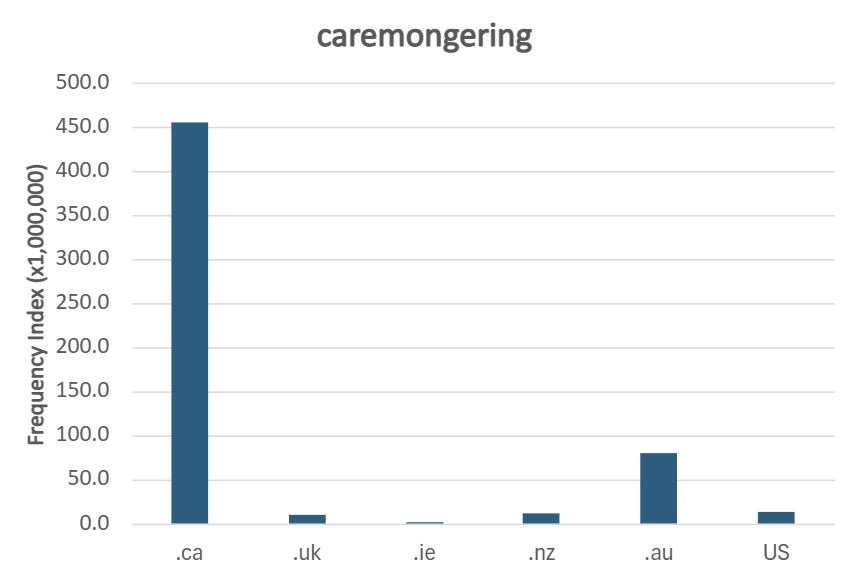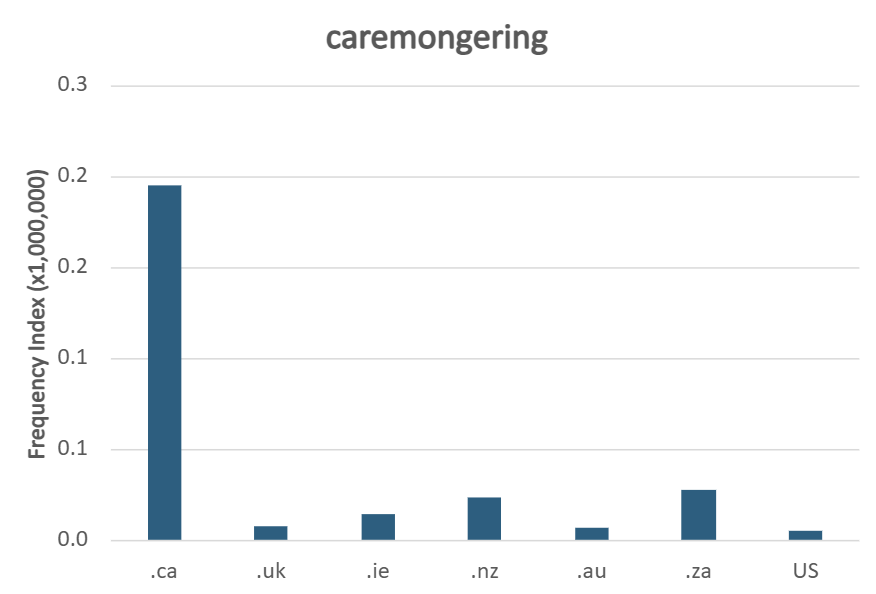Quick links
caremongering
DCHP-3 (Apr 2025)
Spelling variants:Caremongering, "caremongering"
n. — Digital life, originally Healthcare, Media; rare today
help for disprivileged people during the COVID-19 pandemic.
Type: 1. Origin — The term can be dated to March 2020. Currently, the earliest attestation is from 16 March 2020 (see related quotation), the date that a federal lockdown was imposed. Seow et al. (2021) studied the spread of the term in Canada's healthcare professional pages and concluded that to "combat social distancing and stay-at-home restrictions due to COVID-19, Canadian communities began a Facebook social media movement, #Caremongering, to support vulnerable individuals in their communities."
A blend of care and mongering and intended as an antonym to scaremongering (see the 2022 quotation), this term symbolizes the power of language in social movements.
Chart 1 shows the distribution in April 2020, with Canada leading and the frequency being considerable at the time (450 index points). Five years later, Canada is still leading in the international comparison (see Chart 2), though the index points dropped below 1. The term is not nearly as popular in 2025 as it was in 2020. In 2025, the term is used in some non-Covid contexts, e.g. such as helping the poor and homeless (see the 2025 quotation).
A blend of care and mongering and intended as an antonym to scaremongering (see the 2022 quotation), this term symbolizes the power of language in social movements.
Chart 1 shows the distribution in April 2020, with Canada leading and the frequency being considerable at the time (450 index points). Five years later, Canada is still leading in the international comparison (see Chart 2), though the index points dropped below 1. The term is not nearly as popular in 2025 as it was in 2020. In 2025, the term is used in some non-Covid contexts, e.g. such as helping the poor and homeless (see the 2025 quotation).
See: caremonger
Quotations
16 Mar. 2020
‘Caremongering’: Bolton, Orangeville Zehrs, Shoppers Drug Mart offer special hours for seniors, most-vulnerable to shop during COVID-19 pandemic
18 Mar. 2020
The phenomenon of helping people who are disproportionately affected by the virus - especially the elderly or people with underlying health conditions - has been affectionately labelled "caremongering." The BBC reported Monday that more than 35 Facebook groups had been created in the span of just three days in places such as Toronto, Halifax and Ottawa with thousands of members.
2020
The social media trend is "caremongering," where people holed up in their homes can visit sites online, ask for help, find delivery services, and post their thoughts and ideas. All to get through the COVID-19 pandemic in one piece.
2020
Tie-dye, sourdough bread, and puzzles aren’t the only things trending during the pandemic. Although we should’ve been able to predict this, given our reputation for being kind and generous folk, Canadians are uniting in a grassroots movement to help one another out during the coronavirus outbreak, in what has been dubbed “caremongering.” An almost obsessive tendency toward being helpful, and it’s not just a folksy trait, it is manifesting all over the country. Coined initially in a Toronto Facebook group, networks have emerged in cities and towns coast to coast, sharing everything from groceries and volunteer time to useful online resources and uplifting and funny memes, all with the intention of helping neighbours, and especially vulnerable Canadians from at-risk groups.
2021
At the start of the pandemic, Gosselin co-founded Caremongering Fort St. John with Chamber of Commerce President Chuck Fowler, a group initially focused on helping people who were being laid off. The group held food drives, parades to cheer on nurses, and helped out young, struggling families.
2022
Started as a Toronto-based Facebook group early in the pandemic, Caremongering was designed to counteract scaremongering and to connect vulnerable people in the community with the support they need.
2023
But the pandemic also created the circumstances for a type of global, national and local solidarity that has rarely been seen before. In Canada, we saw this unique solidarity in the homegrown “caremongering” movement, where volunteers organized online to offer a helping hand to neighbours and strangers.
References
- Seow et al. (2021) • Link
Images

Chart 1: Internet Domain Search, 18 April 2020
